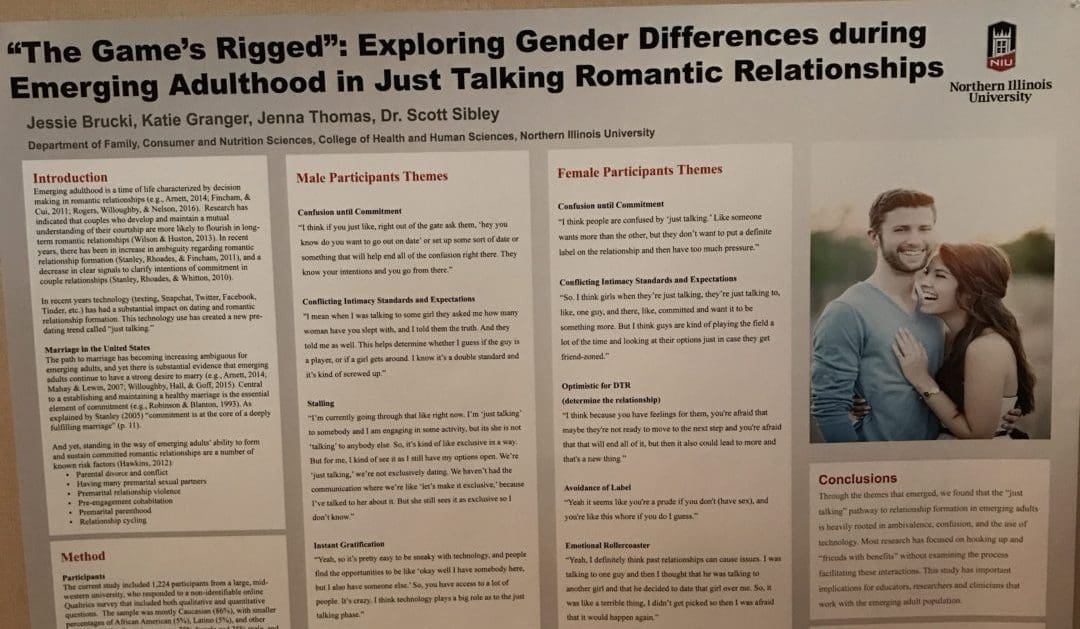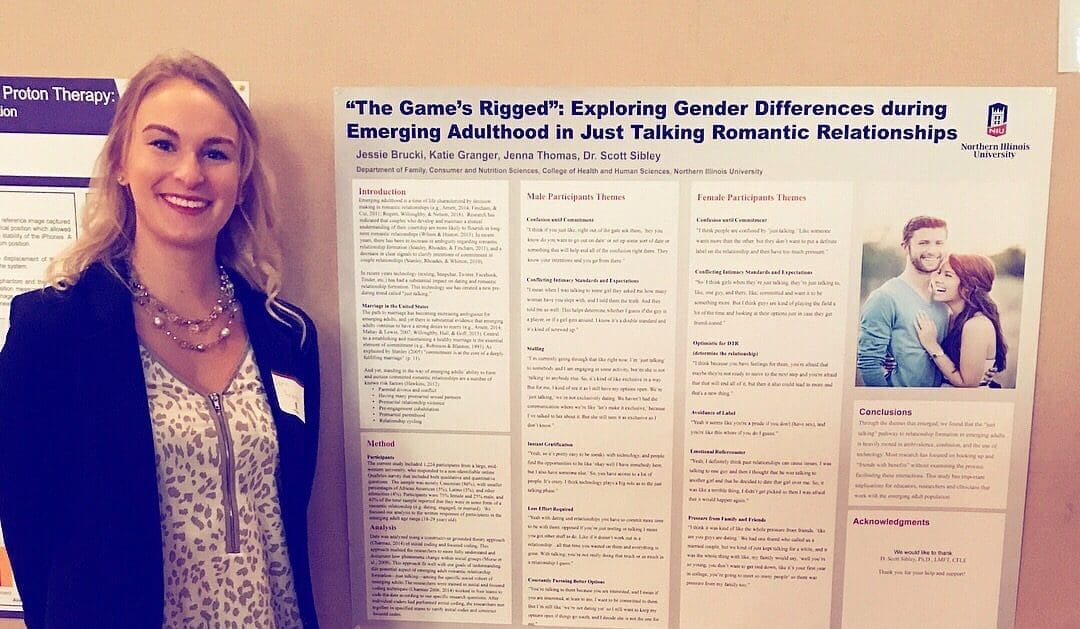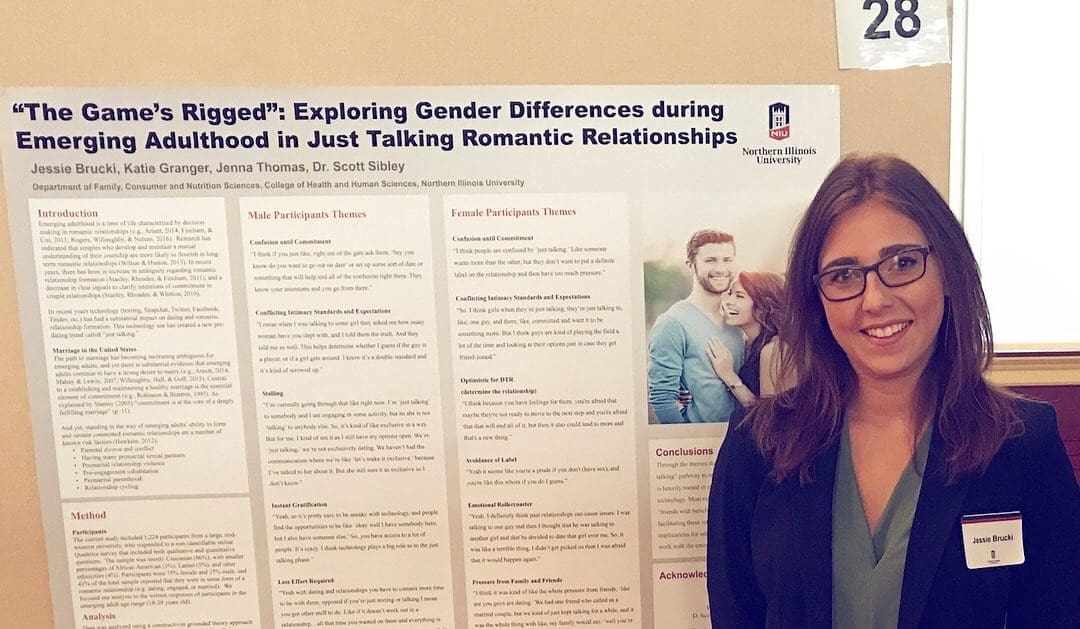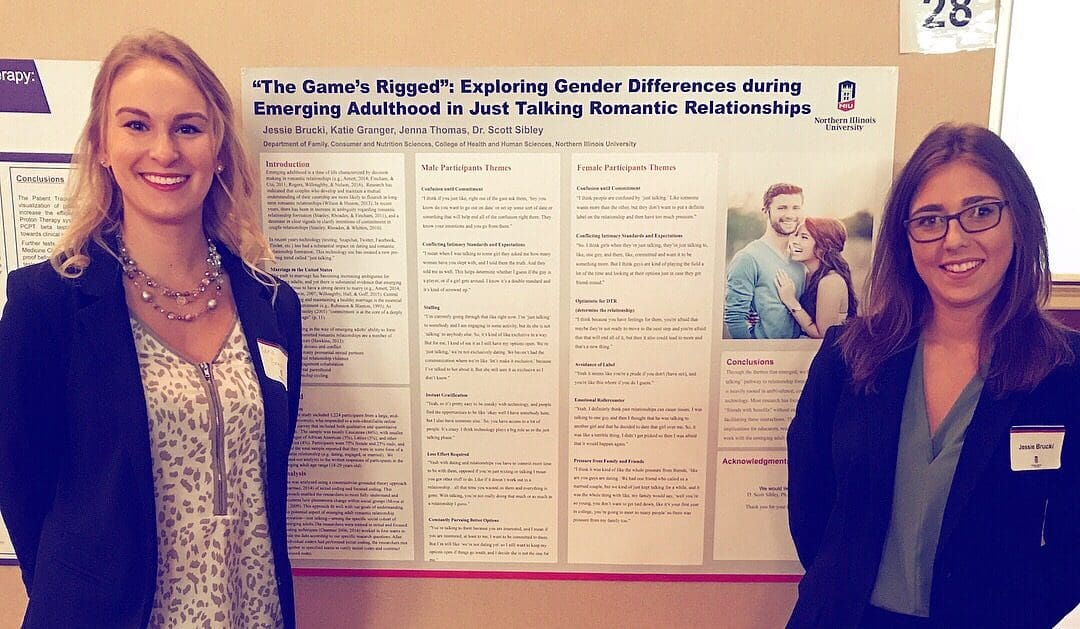Besides presenting at state and national conferences, as a research team we look forward to opportunities to present our research on campus during the semester. We excitedly were able to present our research in the summer semester! On Friday August 11th, two members of our research team participated in a poster presentation of “The Game Is Rigged: Exploring Gender Differences during Emerging Adulthood in Just Talking Romantic Relationships” at the Summer Research Symposium. As we have mentioned a previous blog post, many emerging adults are forming their romantic relationship through a pre-dating facilitated by technology called just talking. The event was hosted by the Office of Student Engagement and Experiential Learning (OSEEL) in Altgeld Hall on our Northern Illinois University campus.
Dr. Sibley and other members of the research team contributed to the preparation of the poster and the presentation at the Summer Research Symposium. On the morning of the event, the research members met in Altgeld Hall to check-in, get their name tags, and hang the poster in the assigned location. The Summer Research Symposium was kicked off by a speech given by a staff member of OSEEL. We then waited for spectators to come around and view our poster. On a somewhat exciting note, we were the only poster presentation who participated in this event from our School of Family and Consumer Sciences.

There was a diverse group of spectators at this event that we were able to interact with and discuss our research to. Northern Illinois University (NIU) Faculty, students and individuals from the community came by our poster and listened to our research. It was exciting to be able to interact with individuals and present on what we are researching. Because of how diverse the of individuals who we were presenting to were, we had the opportunity to educate those who many not be familiar with just talking.
We began our presentation by asking the spectator(s) if they have heard of this new phenomenon of just talking, and then we proceeded to explain the concept of just talking. We then discussed the purpose of our research study, which to explore gender differences in just talking romantic relationships.

Next, we described our method, and the four research questions in the study, which are as followed:
- RQ1: How do men and women define just talking in romantic relationships?
- RQ2: How do just talking relationships facilitate the process of defining the relationship (DTR)?
- RQ3: How does intimacy play a role in just talking romantic relationships?
- RQ4: What are the intentions for entering a just talking romantic relationships?
We also discussed how each focus group consisted of one-hour long focus groups, in order to better understand the concept of “just talking”. All 48 (25 females, 23 males) of our participants were all between the ages of 18 and 29 years-old participated in the focus groups.
Then, we discussed the results. We explained that after the data was analyzed, 12 themes were found (6 themes for men, 6 themes for women). Because there were 12 themes total, the research members alternated the explanations and examples (quotes from participants) for each theme. The themes that emerged from the focus groups about the romantic relationship formation phenomenon included:
- Confusion until Commitment (Women)
- Confusion until Commitment (Men)
- Conflicting Intimacy Standards and Expectations (Women)
- Conflicting Intimacy Standards and Expectations (Men)
- Optimistic for DTR (Defining The Relationship) (Women)
- Forestalling the DTR (Men)
- Avoidance of Labels (Women)
- Instant Gratification (Men)
- Emotional Roller-coaster (Women)
- Pressure from Friends and Family (Women)
- Less Effort Required (Men)
- Constantly Pursuing Better Options (Men)
We concluded our research presentation by explaining that the just talking pathway to romantic relationship formation in emerging adults was found to be heavily rooted in ambivalence, confusion, and the use of technology.

By presenting our poster at the Summer Research Symposium, we were able to get that “first time fear” out of our system. We both agreed the next opportunity we have to present in front of an audience or attend a similar event, it will be much easier having done it once before. As a research team, we look forward to the upcoming conferences and events that will provide us more opportunities to promote our current research projects, our team, and our website!
References
- Sibley, D. S., Knapp, D., Brown, C., Mallory, A., & Vennum, A. (2017). “We’re just talking”: Investigating a new trend in emerging adult romantic relationship formation.
Hi! My name is Katie I am Research Associate in the Center for P-20 Engagement at Northern Illinois University and a former member of Dr. Sibley’s research team. Beginning in the Fall of 2019, I will be a first-year doctoral student and teaching assistant at the Iowa State University in the Department of Human Development and Family Studies.









